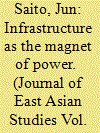|
|
|
Sort Order |
|
|
|
Items / Page
|
|
|
|
|
|
|
| Srl | Item |
| 1 |
ID:
092263


|
|
|
|
|
| Publication |
2009.
|
| Summary/Abstract |
Chinese and Korean protests over "revisionist" Japanese histories of World War II are well known. The impact of contested Chinese and US histories of the Korean War on US-China relations today has received less attention. More broadly, there has been little research seeking to systematically explore just how history textbook controversies matter for international relations. This article experimentally manipulates the impact of nation (US/China), of source (in-group/out-group textbooks), and of valence (positive/negative historical narratives) on measures of beliefs about the past, emotions, collective self-esteem, and threat perception in present-day US-China relations. A 2 × 2 × 2 design exposed randomized groups of Chinese and US university students to fictional high school history textbook accounts of the Korean War. Findings reveal significant effects of nation, source, and valence and suggest that the "historical relevance" of a shared past to national identities in the present has a dramatic impact on how historical controversies affect threat perception.
|
|
|
|
|
|
|
|
|
|
|
|
|
|
|
|
| 2 |
ID:
092261


|
|
|
|
|
| Publication |
2009.
|
| Summary/Abstract |
How can Japan put its past behind? Scholars, journalists, and activists frequently argue that Japan cannot solve its "history problem" unless it follows West Germany's lead in offering contrition for World War II violence. Into this debate, Jennifer Lind's Sorry States: Apologies in International Politics offers an original and provocative contribution. Lind argues that while countries should acknowledge past atrocities, frequent public apologies can be domestically polarizing and diplomatically counterproductive. Sorry States outlines a theory of remembrance and threat perception and tests it in a comparative study of Japanese-South Korean and Franco-German relations after World War II. Its methods, data, and findings will interest not only East Asianists, but also scholars of international reconciliation and security studies more broadly. This roundtable presents three critical essays in addition to a response by the author. They discuss the mechanisms through which historical memory influences perceptions of threat, the relative weight of ideational versus material factors in threat perception, and whether changes in international norms and economic interdependence may increasingly pressure countries to confront past violence.
|
|
|
|
|
|
|
|
|
|
|
|
|
|
|
|
| 3 |
ID:
092260


|
|
|
|
|
| Publication |
2009.
|
| Summary/Abstract |
Much has been written on the triangular, and increasingly high-profile, China-Taiwan-US relations. However, scholars have yet to apply Diversionary Theory to the China-Taiwan dyad. DT argues that leaders may resort to international conflict when domestic political and economic situations become troublesome, aiming at directing public attention away from problems at home. While creation of explicit military conflict in the Taiwan Strait by Taipei is deemed quite unlikely, more subtle processes of diversion might be expected instead. This article applies a variant on DT to assess whether leaders in Taipei have used rhetoric about Taiwan independence or unification as a distraction from domestic problems during the years leading up to Taiwan's 2004 presidential election. We find that, as the president's approval sinks, pro-independence rhetoric becomes more likely. Overall, the results of this study confirm extension of DT to the case of Taiwan and encourage further research applied to middle powers.
|
|
|
|
|
|
|
|
|
|
|
|
|
|
|
|
| 4 |
ID:
092264


|
|
|
|
|
| Publication |
2009.
|
| Summary/Abstract |
By examining party-switching decisions among members of Japan's Liberal Democratic Party (LDP), this article shows how distributive policy programs exclusively available to the governing party attract incumbents to the party in power. In a stable electoral environment where the government party is likely to stay in power, legislators elected from infrastructure-poor constituencies are effectively tied to the party. However, when the party's electoral prospects are uncertain, legislators behave more sincerely and switch parties to match their policy preferences. It is also found that defectors elected from infrastructure-poor constituencies tended to return to the LDP once the party installed a stable surplus coalition.
|
|
|
|
|
|
|
|
|
|
|
|
|
|
|
|
| 5 |
ID:
092262


|
|
|
|
|
| Publication |
2009.
|
| Summary/Abstract |
When China embarked on economic reform in the late 1970s, its leaders aspired to learn from Japan's developmental policies that were restrictive of foreign capital. In the 1990s, China strove again to emulate Japan and South Korea in restricting foreign direct investment and promoting indigenous corporations. Despite these efforts, China's industrial catch-up was in fact led by FDI, in sharp contrast to the classic Japanese/Korean paradigm where FDI was strictly circumvented. Why was China unsuccessful in learning restrictive FDI policies? How did a new developmental path emerge in China? The answer lies in China's strong networks with diaspora communities. Through a diffusion mechanism, ties between local governments and diaspora capital helped initiate and catalyze China's FDI liberalization, despite the central efforts to learn from Japan and South Korea. Two critical reform episodes are examined: (1) the establishment of special economic zones and (2) the reform of state-owned enterprises.
|
|
|
|
|
|
|
|
|
|
|
|
|
|
|
|
|
|
|
|
|